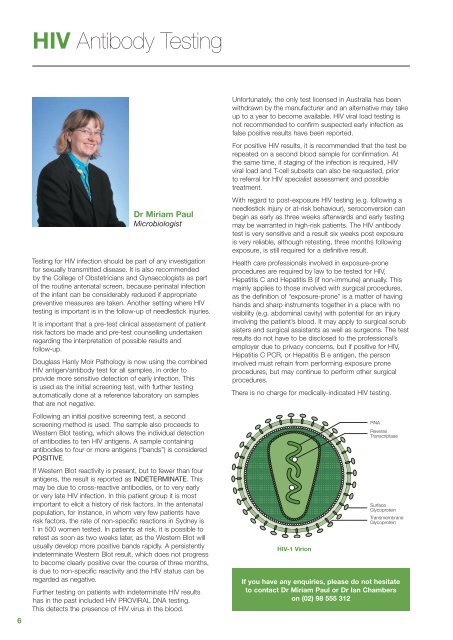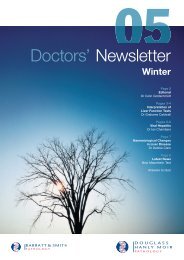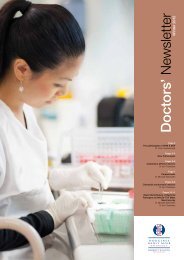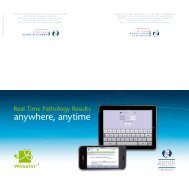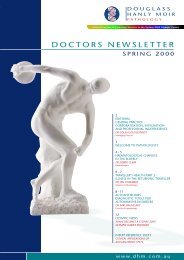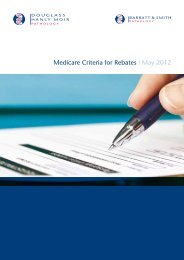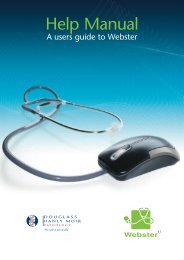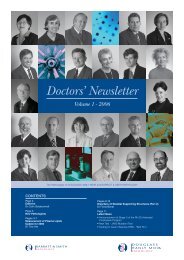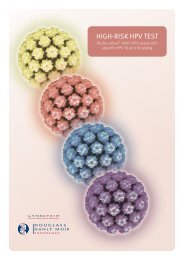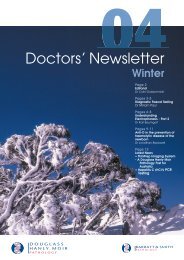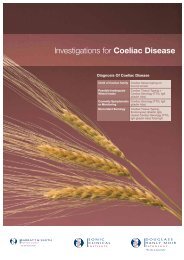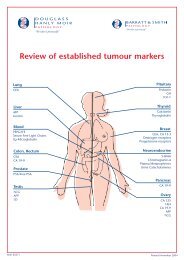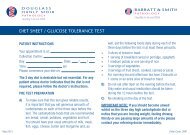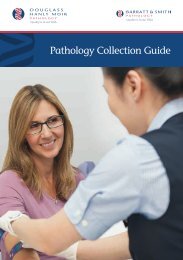NEWS(spring '05). - Douglass Hanly Moir Pathology
NEWS(spring '05). - Douglass Hanly Moir Pathology
NEWS(spring '05). - Douglass Hanly Moir Pathology
Create successful ePaper yourself
Turn your PDF publications into a flip-book with our unique Google optimized e-Paper software.
HIV Antibody Testing6Dr Miriam PaulMicrobiologistTesting for HIV infection should be part of any investigationfor sexually transmitted disease. It is also recommendedby the College of Obstetricians and Gynaecologists as partof the routine antenatal screen, because perinatal infectionof the infant can be considerably reduced if appropriatepreventive measures are taken. Another setting where HIVtesting is important is in the follow-up of needlestick injuries.It is important that a pre-test clinical assessment of patientrisk factors be made and pre-test counselling undertakenregarding the interpretation of possible results andfollow-up.<strong>Douglass</strong> <strong>Hanly</strong> <strong>Moir</strong> <strong>Pathology</strong> is now using the combinedHIV antigen/antibody test for all samples, in order toprovide more sensitive detection of early infection. Thisis used as the initial screening test, with further testingautomatically done at a reference laboratory on samplesthat are not negative.Following an initial positive screening test, a secondscreening method is used. The sample also proceeds toWestern Blot testing, which allows the individual detectionof antibodies to ten HIV antigens. A sample containingantibodies to four or more antigens (“bands”) is consideredPOSITIVE.If Western Blot reactivity is present, but to fewer than fourantigens, the result is reported as INDETERMINATE. Thismay be due to cross-reactive antibodies, or to very earlyor very late HIV infection. In this patient group it is mostimportant to elicit a history of risk factors. In the antenatalpopulation, for instance, in whom very few patients haverisk factors, the rate of non-specific reactions in Sydney is1 in 500 women tested. In patients at risk, it is possible toretest as soon as two weeks later, as the Western Blot willusually develop more positive bands rapidly. A persistentlyindeterminate Western Blot result, which does not progressto become clearly positive over the course of three months,is due to non-specific reactivity and the HIV status can beregarded as negative.Further testing on patients with indeterminate HIV resultshas in the past included HIV PROVIRAL DNA testing.This detects the presence of HIV virus in the blood.Unfortunately, the only test licensed in Australia has beenwithdrawn by the manufacturer and an alternative may takeup to a year to become available. HIV viral load testing isnot recommended to confirm suspected early infection asfalse positive results have been reported.For positive HIV results, it is recommended that the test berepeated on a second blood sample for confirmation. Atthe same time, if staging of the infection is required, HIVviral load and T-cell subsets can also be requested, priorto referral for HIV specialist assessment and possibletreatment.With regard to post-exposure HIV testing (e.g. following aneedlestick injury or at-risk behaviour), seroconversion canbegin as early as three weeks afterwards and early testingmay be warranted in high-risk patients. The HIV antibodytest is very sensitive and a result six weeks post exposureis very reliable, although retesting, three months followingexposure, is still required for a definitive result.Health care professionals involved in exposure-proneprocedures are required by law to be tested for HIV,Hepatitis C and Hepatitis B (if non-immune) annually. Thismainly applies to those involved with surgical procedures,as the definition of “exposure-prone” is a matter of havinghands and sharp instruments together in a place with novisibility (e.g. abdominal cavity) with potential for an injuryinvolving the patient’s blood. It may apply to surgical scrubsisters and surgical assistants as well as surgeons. The testresults do not have to be disclosed to the professional’semployer due to privacy concerns, but if positive for HIV,Hepatitis C PCR, or Hepatitis B e antigen, the personinvolved must refrain from performing exposure proneprocedures, but may continue to perform other surgicalprocedures.There is no charge for medically-indicated HIV testing.HIV-1 VirionRNAReverseTranscriptaseSurfaceGlycoproteinTransmembraneGlycoproteinIf you have any enquiries, please do not hesitateto contact Dr Miriam Paul or Dr Ian Chamberson (02) 98 555 312


